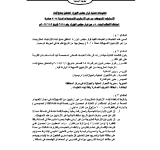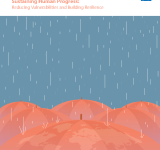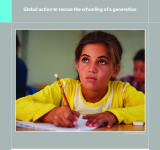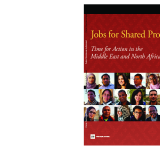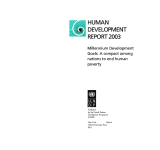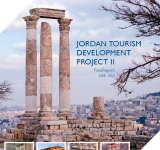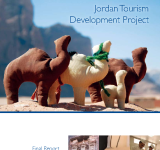investment
يلقي تقرير التنمية البشرية لعام 214 الذي جاء بعنوان "المضي في التقدم: بناء المنعة لدرء المخاطر" الضوء على الحاجة لترويج خيارات الناس وحماية إنجازات التنمية البشرية. ويعتبر التقرير أن الاستضعاف والتعرض
The report assesses the practical challenges of education and schooling for the Syrian children in refugee camps in Jordan;; Lebanon and Egypt as the Syrian Crisis prolongs. It argues that ensuring the continued access to learning is an essential platform for protection;; social stabilization and economic recovery that the international community should not ignore. The report also includes important figures and statistics revealing the alarming situation of education and school. Some of the key statistics are the host-country school-age children compared to Syrian school-age children;; Syrian children enrolled in public schools in Lebanon and Jordan and school-age Syrian refugee children in and out of school by countries such as Iraq;; Egypt;; Turkey;; Jordan and Lebanon. The report concludes with four key recommendations to be undertaken by regional governments and their international partners so that the fundamental right to quality education can be guaranteed to the Syrian children.
Jobs are crucial for individual well-being. They provide a livelihood and;; equally important;; a sense of dignity. They are also crucial for collective well-being and economic growth. However;; the rules and the incentives that govern labor markets in MENA countries have led to inefficient and inequitable outcomes on the personal and collective standpoint. Several underlying distortions prevent a more productive use of human capital and have led to a widespread sense of unfairness and exclusion;; of which the Arab Spring was a powerful expression.
This report provides an assessment of the Millennium Development Goals;; laid out by the UN Millennium Declaration. The UN Millennium Declaration was adopted in September of 2000 as a commitment on the part of the world's leading nations to reduce poverty;; improve health and promote peace;; human rights;; and environmental sustainability. The Millennium Development Goals are specific;; measurable targets that aim to reduce extreme global poverty by the year 2015. This report analyzes the challenges and barriers to meeting these goals as of 2003;; examining the successes and failures of various nations and the gaps that exist between regions and countries with regards to economic growth and human development. This report then examines the successes and failures of public and private policies with regards to hunger;; health;; water and sanitation;; education;; and environmental sustainability. This report also analyzes the participation of civil society throughout the world and the mobilization of grassroots support for the various human development goals. Finally;; this report presents a number of recommendations on what countries can do to best support these goals.
The USAID Jordan Tourism Development Project is the largest dedicated tourism development project implemented by the United States Agency for International Development. The final report for the project phase of 2008-2013 shares success stories of developing Jordan's tourism sector and increasing the number of visitors to the country according to the updated national strategy for the current period with new targets and implementation of actions. The report highlights the projects' achievements in supporting archaeological conservation of key sites such as Petra;; Madaba and Amman Citadel and improving the visitor experience in Jordan through an extenstive nationwide training program. The final report also includes the stories of those who benefitted from USAID's investment in tourism and the USAID tourism project's comprehensive sustainable tourism industry development approach.
The final report is the product of the Jordan Tourism Development Project;; which is a three-year project that operated from August 2005 to August 2008. The Project worked closely with government stakeholders;; particularly the Ministry of Tourism and Antiquities and Department of Antiquities;; along with the private sector;; local communities and the tourism industry to help develop Jordan's tourism industry. As part of the project;; the USAID/Jordan's primary aim was to develop Jordan's key tourism institutions and improve the institutional environment to better facilitate tourism development. The project also worked to change perceptions of the industry through a nationwide campaign that entailed workshops;; training sessions and delivering key messages by distributing brochures;; flyers and posters. According to the report;; the work of the USAID/ Jordan Tourism Development Project has created strong momentum among the government and private sectors;; as well as communities;; for positive development of tourism in Jordan;; leaving much scope for further development of the country's tourism sector to bring Jordan closer to operating a full-fledged tourism industry that attracts increasing numbers of tourists and effectively meets their growing demands. The report also finds several areas that still need improvement such as the awareness of the importance of tourism to Jordan;; marketing and recruitment for tourism institutions and standards of tourism accommodation.
